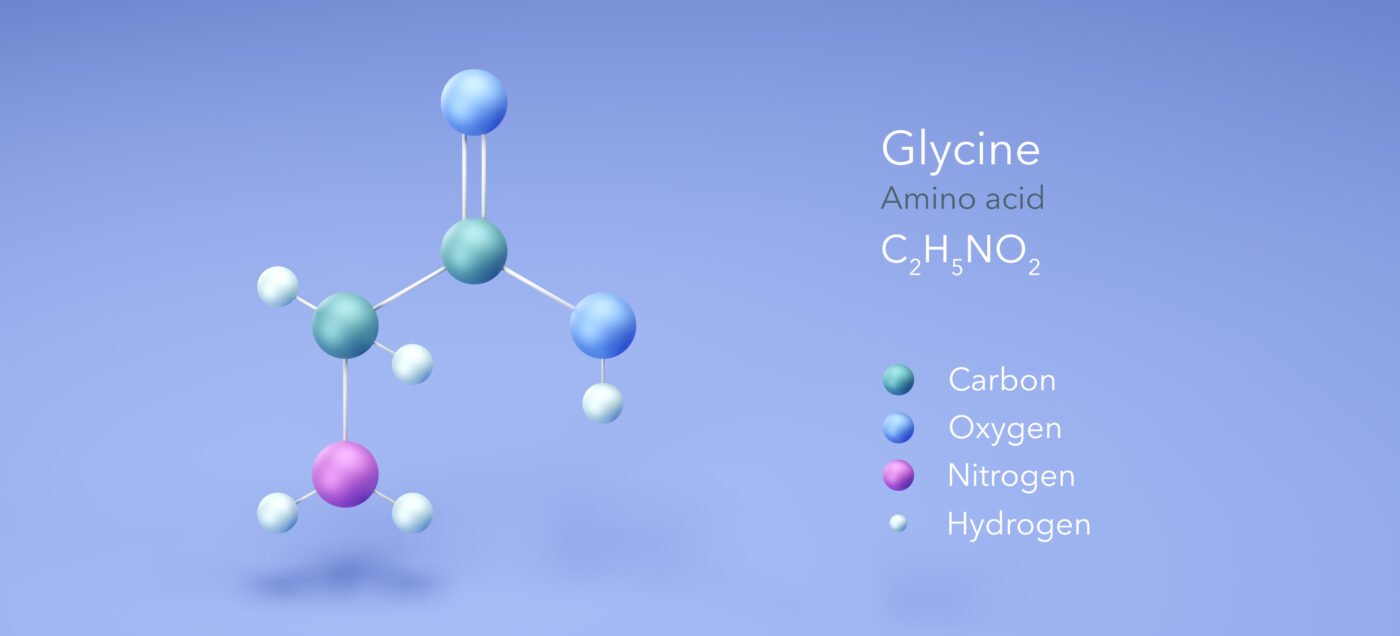Glycine is a non-essential amino acid that is nonetheless necessary for many health-promoting metabolic processes.
It is an integral part of protiens made inside the body, a precursor for important biomolecules like glutathione and creatine, and acts as an inhibitory (calming) neurotransmitter in the central nervous system.
Research strongly supports glycine’s potential to protect health and longevity in in animal and human clinical trials.

Key Points
- Glycine improved sleep quality, reduced fatigue, and enhanced cognition in sleep-deprived individuals.
- Supplemental glycine reduced oxidative stress and improved antioxidant defenses in the elderly and those with metabolic syndrome.
- Glycine supplementation improved endothelial function and lowered blood pressure in metabolic syndrome patients.
- It reduced inflammation post-heart surgery and in liver damage studies.
- Glycine protected mitochondrial function and promoted longevity by inducing autophagy.
Glycine Improves Sleep Quality and Cognition
In one trial, 3 grams of glycine taken before bedtime improved sleep quality, reduced sleepiness, and enhanced cognitive function the following day in individuals experiencing unsatisfactory sleep. The effects were seen on the first night and remained over the 4-week study period. (1)
“The present observation indicates that glycine significantly alleviates the feeling of fatigue upon getting up in the morning as measured in the SAM Fatigue Checklist. It also exerted a positive effect on clearheadedness in the morning.”
Another study found that 3 grams of glycine improved memory recognition in sleep-restricted young adults, suggesting it could help mitigate the cognitive impact of poor sleep. (2)
“Glycine significantly improved feelings of fatigue compared with the placebo and showed a tendency to reduce sleepiness and significant improvement in performance.”

Glycine Reduces Oxidative Stress and Improves Metabolic Health
In an 8-week trial, 15 grams per day of glycine reduced markers of oxidative stress and enhanced participants’ antioxidant defenses in healthy elderly individuals. (3)
“Replenishing the supply of cysteine and glycine by oral supplementation is effective at restoring glutathione concentrations and reducing oxidative stress to levels observed in young healthy humans.”
Another study that focused on patients with metabolic syndrome. In this study, participants:(4)
- Were administered 15 grams of glycine per day for 3 months
- Improved multiple metabolic health markers
- Decreased HbA1C (a marker of circulating glucose control)
- Reduced oxidative stress as measured by a 50% decrease in plasma oxidized low-density lipoprotein (OxLDL).
- Participants experienced improved insulin sensitivity and lowered levels of inflammation as well.
“The significant decrease in A1C could be attributed to a preferential non-enzymatic glycation of glycine, similar to non-enzymatic glycation of other amino acids, which prevents the formation of A1C, glycation of proteins, formation of advanced glycation end products (AGE), and RAGE (AGE receptor) activation.”
Glycine Supports Cardiovascular Health
In a 3-month clinical trial, glycine (15 g/day) improved vascular function and reduced blood pressure in patients with metabolic syndrome. (4)
Glycine Provides Antioxidant and Anti-inflammatory Benefits
Glycine also exhibits anti-inflammatory properties. In a study on humans undergoing heart surgery, intravenous glycine reduced post-surgical inflammation, as evidenced by lower levels of pro-inflammatory cytokines IL-6 and TNF-alpha. (5)
Glycine administered to mice with liver damage reduced inflammatory infiltration and reduced harmful cytokine concentrations via NF-κB inhibition. (6)
“Glycine inhibits the production of pro-inflammatory cytokines like TNF-α, interleukin6 (IL-6), and IL-1β and increases the production of the anti-inflammatory cytokine IL-10 in activated macrophages, leucocytes, and T lymphocytes” (6)
Glycine given to rats with alcohol-induced liver damage normalized lipid peroxidation enzyme levels and inhibited superoxide dismutase activity, indicating increased antioxidant capacity in the injured tissue. These mice also had improved markers of inflammation. (7)

Glycine Supports Mitochondrial Function
Mitochondria are far more the powerhouses of our cells, responsible for producing energy as well as signaling molecules.
In a study of older men infected with HIV who were glutathione deficient, supplemental glycine and cysteine:(8)
- Improved mitochondrial fuel oxidation
- Enhanced insulin-stimulated glucose oxidation by 61%
- Increased glutathione concentration and synthesis by 66%
Bioavailability
Bioavailability refers to the relative amount of any substance that can be effectively absorbed into circulation and delivered to cells and tissues to have a biological effect.
Glycine, as the smallest amino acid, has high bioavailability due to its minimal complexity and the efficient absorption mechanisms in the gastrointestinal tract.
When ingested, glycine is readily absorbed by passive amino acid transporters, facilitating its systemic availability and subsequent biological effects.
